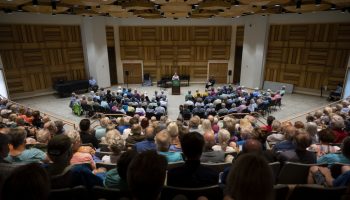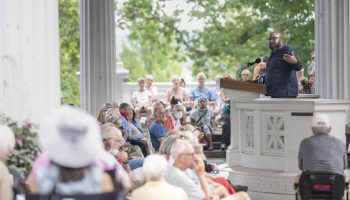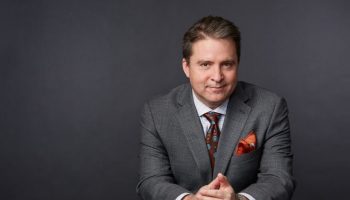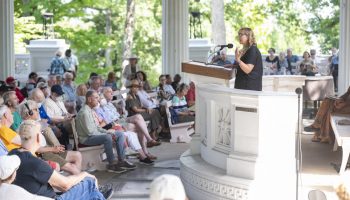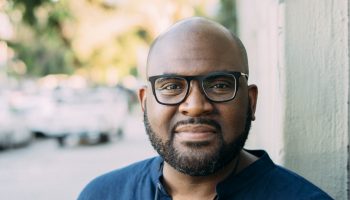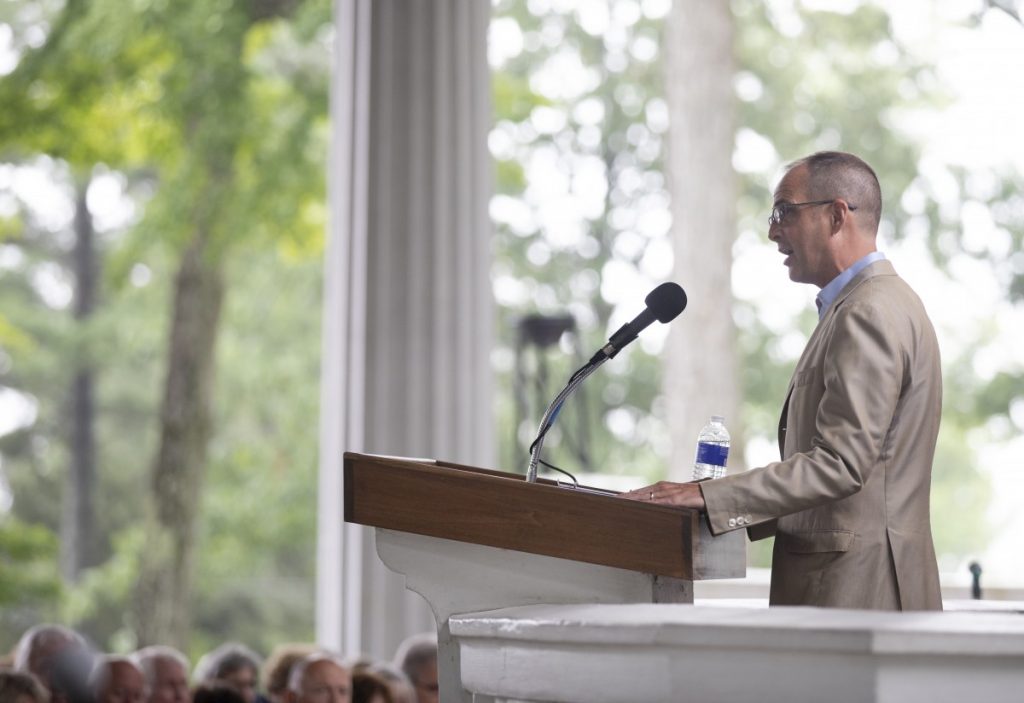
“In feature films, the director is God,” Alfred Hitchcock once said. “In documentary films, God is the director.”
Documentarian Macky Alston said that he has repeatedly found truth in this quote and often questions if he is playing God as a filmmaker.
“Like in so many professions, as a documentary director you make split-second decisions that have permanent consequences and you just pray that you’re playing on God’s team,” Alston said.
At 2 p.m. Wednesday in the Hall of Philosophy, Alston shared his experiences as a filmmaker in a lecture titled “Playing (with) God: Revelations from the Filmmaking Front about God, Good Storytelling and How to Do Right by Each Other as We Make Sense of Life.” Alston’s lecture was part of the interfaith theme for Week Nine, “The Intersection of Cinema and Religious Values.”
Alston is the senior vice president for prophetic and creative leadership at Auburn Seminary, where he oversees the Hartley Media Impact Initiative. His directing credits include “Family Name,” “Hard Road Home” and “Love Free or Die,” a documentary that tells the story of the Rt. Rev. Gene V. Robinson, the first openly gay person to be elected bishop in the high church traditions of Christendom. The film won the Special Jury Prize for an Agent of Change at the 2012 Sundance film festival. Its subject, Robinson, is now Chautauqua’s vice president of religion.
Alston prefaced his lecture with his personal definition of “God.”
“Let me say right up front that by God, I mean the mysterious life force of love and liberation,” Alston said. “While I was raised and practice my faith as a Christian, I do not believe in only one face or form of divine.”
With this definition in mind, Alston asked the audience to picture a moment from his film “The Killer Within,” a 2006 documentary about one of the nation’s first school shooters in modern U.S. history, Bob Bechtel, who in 1955 planned to kill everyone in his dormitory as a student at Swarthmore College, but stopped after killing Holmes Strozier in his sleep.
Alston asked the audience to step into his shoes as the director.
“You are the one person on Earth connecting (Strozier’s brother) John, the only remaining family member of the murdered college student, and Bob, his murderer and former classmate,” Alston said. “It’s 50 years after the crime … and they’ve wondered about each other for every waking night since the crime. As you interview them, each asks you with a hunger that has grown more ravenous with each passing year about the welfare, the nature, the story of the other.”
Alston said the way the story was told would shape how both men would “make sense of the central tragedy of their lives,” in addition to how the film’s viewers would understand their own lives and God.
“As you describe one (man) to the other, are you playing God?” Alston said. “Or are you serving him in God’s mission to spread love. Are you playing on God’s team?”
Alston shared another anecdote from his experience directing “Love Free or Die” when Thomas Shaw, another bishop, came out as a gay man on camera during an interview about Robinson.
Alston said this interview occurred at a “critical time” in the movement for LGBT equality, during a global, decennial gathering of Anglican bishops to determine doctrine and policy, “including whether or not Gene, and all LGBT people around the globe are made as LGBT people in the image of God, whether we are fully human, or still less than human in the eyes of the church.”
“Now you know that Gene is receiving daily death threats, staying at an undisclosed location and has a Pinkerton bodyguard shadowing his every move,” Alston said. “Now you’ve just been told that there’s not one, but two gay bishops in the house and this other bishop has serious clout in the global communion, one of a few bishops, if I’m remembering correctly, residing at the home of the archbishop of Canterbury during the global gathering.”
Given the power this revelation has “over the fate of millions of your LGBT brothers and sisters,” Alston said, “what are you, a documentary director, to do with this knowledge, with this footage, if you aim to be playing on God’s team?”
Finally, Alston offered a third not-so-hypothetical dilemma based on his experience directing “Hard Road Home.”
Julio Medina, the head of a Harlem-based center designed to keep formerly incarcerated people from returning to prison, gets a call from Alberto, who has been missing for weeks and is now standing outside the building demanding his last paycheck. Medina is sure that handing over the check will ensure that Alberto is behind bars in a matter of days, and will relapse into addiction and crime, thus undermining the stability that he has worked for over the last few years.
“In this moment of crisis, you turn to Julio, who is trying to save the life of Alberto, his colleague, his friend, the person who reminds him most of himself,” Alston said. “You say to Julio, ‘What should I do? Should I keep filming?’ And Julio looks you dead in the eyes and says ‘Macky, you do your job, I’ll do mine.’ ”
Alston said all three situations put him in a position as a filmmaker to play God.
“As we all see in public life and know from our own experience, playing God is a very dangerous thing to do,” he said.
Alston said he was the only one capable of telling Bechtel that John Strozier was a happily married rocket scientist with children, “as his brother might have been if Bob hadn’t killed him when they were in college together.” And, Alston said, “that John was broken for life by that one action that Bob, a man he would never meet, took.”
“For better or for worse,” Alston said, “it was based on my witness to Bob, the killer, that he did the work at the end of his life of reckoning with his actions and his conscience before he died.”
Shaw — the gay bishop — is dead now, too, Alston said.
“He took the opportunity of being in my film, ‘Love Free or Die,’ to come out to the world,” Alston said. “I was with him when we screened the film and he shared news of his sexuality with his diocese. The audience of priests and other professionals for whom he was responsible gave him a standing ovation.”
Alston said he was happy to announce that Alberto, the man who collected his check and indeed returned to jail, was not dead but alive and well with his family, according to an Aug. 18 Facebook post.
“Once the film was out, … he became renowned among his fellow inmates for being the powerhouse caseworker and movie star you see in the film,” Alston said. “Alberto told me over lunch that the movie showed him what he’s capable of, and he declared now that he’s never going back to jail.”
Alston said these outcomes were all influenced by the choices he made as a filmmaker.
At times in his career, Alston said he has doubted the divine, such as after the death of his friend Alan Smith during the AIDS epidemic.
This prompted Alston to direct another documentary, “Questioning Faith: Confessions of a Seminarian,” a 2002 film that follows five individuals of various religious backgrounds as they battle with suffering in their faith.
Alston said the style of documentary also impacts the director’s ability to play God.
“Of the five documentary features I’ve directed, three of them lean toward cinéma-vérité style, in which the director’s camera functions as the eye of God, a fly on the wall,” he said. “Two of them, however, including this one, ‘Questioning Faith,’ were first-person documentary films; in other words I, the director, am a character in the film.”
Alston said he felt with these particular narratives that expose the “frailty and flaws of others,” he had to self-impose the same standard.
For “Family Name,” Alston interviewed white and black families that, due to a shared history with slavery, carried the documentarian’s last name.
“The theory behind making the film was that white and black Americans needed to have truth-telling conversations about making this country,” Alston said.
While directing “Family Name,” Alston met two older, white Alston siblings who intended to give their plantation to the state of North Carolina in their will in hopes of it being converted to a foundation for classical music. By happenstance, Alston had met a classical oboist named Fred Alston.
“Throughout his career, Fred played all over the world, but in his mind he was always planning a program he would like to play of classical musical written by black composers throughout the history of the art form,” the documentarian said.
While leaving the plantation, Alston said he realized the link.
“Black and white Alstons had dreams about music in relation to that history on that land,” he said. “Alstons from all over came to hear (Fred) speak the truth of the land, his family story and play this music of pain and the power of human spirit.”
Alston said he believes that God directed that scene, but is not sure that God directed the whole film, as no one in the film every uttered the word “reparations.”
With this mind, Alston said he is planning another first-person film to give “God’s liberation and love” the last word on slavery and the genocide of Native American people, “both atrocities continuing to bear their poisonous fruit today.”
To conclude his lecture, Alston offered three lessons for people to follow if they want to be God’s co-director or assistant director, rather than the devil’s.
Alston said he learned the first rule, “not every story is yours to tell,” on a Swiss-Family Robinson-esque adventure he had taken with his husband and children in hopes of making into a documentary about same-sex parenting. Alston later realized that he had no right to make a movie out of his children’s vulnerabilities and private lives.
In the same vein, Alston declined to make a documentary about artistic communities comprised of people of color, as he believed this story should be told by a filmmaker from within the community.
Alston’s second lesson: “In making documentary films about yourself or others, you are playing with people’s lives.”
Alston cited the moment when he did not intervene, but filmed Alberto, with permission, collecting his check.
“I remember his glance as he passed me,” Alston said. “He eyed me with love.”
Although Alston believes “Hard Road Home,” now screened at rehabilitation centers nationwide, did some good in the world, there is no doubt that his storytelling affected the lives of the film’s subjects.
Lastly, Alston told the audience that “the stories we tell shape lives and shape history, for better or for worse.”
After realizing that he was the filmmaker to tell Robinson’s story, Alston said “Love Free or Die” played a significant role in 2012 in the four states where marriage equality was on the November ballot. In addition to 400 community-based screenings of the film, a companion campaign encouraged LGBT allies to talk with their Christian friends and family “to vote on the right side of history.”
“In the two states that did exit polls, we learned the Christian messengers, and messaging that we trained them on, played a key role in swinging a critical segment of voters,” Alston said.
Alston said all people, not just documentarians, have the power to shape history by telling stories like “you’ll never get into college,” or “you can do anything”; “immigrants are rapists,” or “immigrants are us.”
“As we tell the stories that are ours to tell, may we be careful, loving even, as we play with the lives of people whose stories we share,” Alston said. “Then Alfred Hitchcock will be proven true. In these stories that document real life, it will be God — by which I mean the power of love and liberation — that directs us.”

